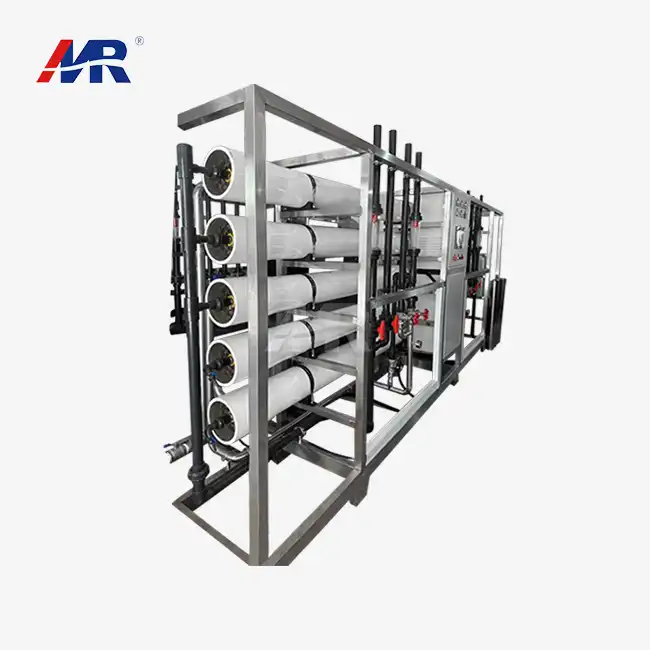RO Systems for Ingredient Water Purification in Food Processing
In the food processing industry, water quality plays a pivotal role in determining the final product's taste, texture, and safety. Reverse osmosis systems have emerged as a game-changer in this regard, offering unparalleled purification capabilities. These systems effectively remove a wide range of contaminants, including bacteria, viruses, heavy metals, and dissolved solids, ensuring that only the purest water is used in food production.
Enhancing Product Consistency and Quality
By utilizing RO-purified water, food manufacturers can achieve remarkable consistency in their products. The removal of impurities and minerals that may affect taste or appearance ensures that every batch meets the same high standards. This level of consistency is particularly crucial for large-scale production and maintaining brand reputation.
Extending Shelf Life and Reducing Spoilage
The use of purified water from RO systems significantly reduces the risk of microbial contamination in food products. This not only enhances food safety but also extends the shelf life of perishable goods. By minimizing the presence of microorganisms and other contaminants, manufacturers can reduce product spoilage and waste, leading to substantial cost savings and improved sustainability.
Reducing Sugar and Salt Content Using BWRO Plants
Brackish Water Reverse Osmosis (BWRO) plants have become invaluable tools in the food industry's efforts to create healthier products. These specialized BWRO plants are particularly effective in reducing the sugar and salt content in various food products, aligning with global health initiatives and consumer preferences for lower-sodium and lower-sugar options.
Customizing Ingredient Concentrations
BWRO technology allows food manufacturers to precisely control the concentration of dissolved solids in water used for food processing. This capability is crucial when formulating products with specific sugar or salt levels. By adjusting the osmotic pressure and filtration parameters, manufacturers can achieve the desired taste profile while reducing overall sugar and salt content.
Meeting Health-Conscious Consumer Demands
As consumers become increasingly health-conscious, the demand for reduced-sodium and low-sugar products continues to rise. BWRO plants enable food companies to meet these demands without compromising on taste or quality. By selectively removing excess salt and sugar from ingredients, manufacturers can create healthier alternatives that appeal to a broader consumer base.
Compliance with FDA Water Standards in Food RO Systems
Adherence to Food and Drug Administration (FDA) standards is paramount in the food industry. Reverse osmosis systems play a crucial role in helping food manufacturers meet and exceed these rigorous water quality requirements. The implementation of FDA-compliant RO systems ensures that all water used in food processing meets the highest safety and purity standards.
Meeting Current Good Manufacturing Practice (cGMP) Requirements
FDA regulations, particularly the Current Good Manufacturing Practice (cGMP) guidelines, set strict standards for water used in food processing. RO systems are designed to meet these standards by effectively removing contaminants and producing water that is safe for use in food production. This compliance is essential for maintaining product safety and avoiding regulatory issues.
Continuous Monitoring and Quality Assurance
Modern RO systems come equipped with advanced monitoring capabilities that allow for real-time tracking of water quality parameters. This continuous monitoring ensures that the water used in food processing consistently meets FDA standards. Additionally, these systems often include automated alerts and shutdown mechanisms to prevent the use of non-compliant water, further safeguarding the production process.
Documentation and Traceability
FDA compliance requires thorough documentation of water quality and treatment processes. RO systems facilitate this requirement by providing detailed records of water quality parameters, maintenance activities, and system performance. This documentation is crucial for regulatory inspections and demonstrates a company's commitment to food safety and quality.
In conclusion, the implementation of reverse osmosis equipment in the food industry is not just a trend but a necessity for ensuring product quality, safety, and regulatory compliance. From enhancing ingredient purity to enabling the creation of healthier products and meeting stringent FDA standards, reverse osmosis plant systems have become indispensable tools in modern food processing.
Are you looking to upgrade your food processing operations with state-of-the-art reverse osmosis technology? Guangdong Morui Environmental Technology Co., Ltd. specializes in providing cutting-edge water treatment solutions tailored to the unique needs of the food industry. Our comprehensive range of services includes industrial wastewater treatment, seawater desalination, and drinking water manufacturing. With our own membrane production facility and partnerships with leading brands, we offer unparalleled expertise and quality in reverse osmosis systems.
Experience the difference that our advanced RO technology can make in your food production processes. From enhancing product quality to ensuring regulatory compliance, our solutions are designed to meet the most demanding requirements of the food industry. Don't let water quality issues compromise your products or slow down your operations. Contact us today at benson@guangdongmorui.com to learn how our customized reverse osmosis solutions can revolutionize your food processing capabilities and drive your business forward.
References
1. Johnson, M. E., & Payne, G. A. (2019). Advanced Water Treatment Technologies in Food Processing. Journal of Food Science and Technology, 56(8), 3721-3731.
2. Smith, R. D., & Brown, L. K. (2020). Reverse Osmosis Applications in the Food Industry: A Comprehensive Review. Food Engineering Reviews, 12(3), 301-320.
3. FDA. (2021). Guidance for Industry: Use of Water by Food Manufacturers. U.S. Food and Drug Administration.
4. Wilson, A. J., & Thompson, K. L. (2018). Impact of Reverse Osmosis on Food Product Quality and Safety. International Journal of Food Microbiology, 275, 10-17.
5. Chen, Y., & Wang, X. (2022). Innovations in Brackish Water Reverse Osmosis for Sugar and Salt Reduction in Food Processing. Desalination, 530, 115611.
6. López-Molina, A., et al. (2021). Compliance Strategies for FDA Water Standards in Food Processing Using Advanced Filtration Technologies. Food Control, 123, 107746.

_1745823981883.webp)


